Pregnancy is often a journey of hope, anticipation, and joy. However, for some couples, this journey is interrupted repeatedly by the heartbreak of miscarriage. Recurrent pregnancy loss (RPL), also known as recurrent miscarriage, is a deeply distressing condition that affects around 1% to 2% of women trying to conceive. It is defined as the loss of two or more consecutive pregnancies before 20 weeks of gestation.
This blog explores the causes, symptoms, diagnostic processes, treatment options, and emotional impact of recurrent pregnancy loss, offering guidance and hope to those navigating this difficult path.
What is Recurrent Pregnancy Loss?
Recurrent Pregnancy Loss (RPL) refers to the occurrence of two or more consecutive miscarriages. While a single miscarriage is relatively common and usually not a cause for concern, multiple pregnancy losses warrant a deeper investigation.
Types of Miscarriage
Early miscarriage: Occurs before 12 weeks of pregnancy.
Late miscarriage: Occurs between 12 and 20 weeks.
Chemical pregnancy: A very early miscarriage, often before the woman realizes she is pregnant.
Causes of Recurrent Pregnancy Loss
Identifying the cause of RPL can be challenging. In about 50% of cases, no clear cause is found. However, several factors are known to contribute:
1. Genetic or Chromosomal Abnormalities
Balanced translocations in one parent can lead to unbalanced genetic material in the fetus, causing miscarriage.
Aneuploidy (abnormal number of chromosomes) is a common cause of early pregnancy loss.
2. Uterine Abnormalities
Congenital anomalies like septate uterus, bicornuate uterus, or uterine fibroids can interfere with implantation and fetal development.
Intrauterine adhesions or scarring can also hinder a successful pregnancy.
3. Hormonal and Metabolic Issues
Thyroid disorders (hypothyroidism or hyperthyroidism).
Uncontrolled diabetes or insulin resistance.
Luteal phase defects, leading to insufficient progesterone levels.
4. Immunological Causes
Antiphospholipid syndrome (APS): An autoimmune disorder where the body attacks its own tissues, increasing the risk of blood clots and miscarriage.
Alloimmune causes: Improper maternal immune response to the fetus.
5. Thrombophilic Disorders
Conditions like Factor V Leiden mutation, Prothrombin gene mutation, and Protein S or C deficiency can increase blood clotting and compromise placental function.
6. Infections
Chronic infections such as Listeria, Toxoplasma, Mycoplasma, or Ureaplasma may lead to miscarriage in some cases.
7. Environmental and Lifestyle Factors
Smoking, alcohol, drug use, excessive caffeine, and exposure to toxins.
Obesity and malnutrition are also risk factors.
8. Age
Advanced maternal age (over 35) is associated with a higher risk of miscarriage due to chromosomal abnormalities.
Symptoms of Recurrent Pregnancy Loss
The symptoms of recurrent pregnancy loss are the same as those of a typical miscarriage:
Vaginal bleeding or spotting
Cramping or abdominal pain
Passing of tissue or clots from the vagina
Sudden loss of pregnancy symptoms (like nausea or breast tenderness)
However, the emotional toll increases with each loss, making psychological symptoms more pronounced:
Grief and loss
Feelings of guilt or inadequacy
Diagnosing Recurrent Pregnancy Loss
A thorough evaluation is essential for identifying underlying causes. Diagnostic approaches typically include:
1. Detailed Medical History and Physical Examination
Past pregnancies, menstrual history, chronic illnesses, family history.
2. Genetic Testing
Karyotyping of both partners.
Chromosomal microarray or PGT (Preimplantation Genetic Testing) during IVF.
3. Blood Tests
Hormone levels (TSH, prolactin, LH, FSH, progesterone).
Antiphospholipid antibodies, ANA, thyroid antibodies.
Screening for thrombophilia.
4. Imaging Studies
Transvaginal ultrasound, hysterosalpingogram (HSG), or MRI to detect uterine anomalies.
5. Endometrial Biopsy
To evaluate the uterine lining and possible inflammation or infections.
Treatment Options for Recurrent Pregnancy Loss
1. Genetic Counseling and IVF
Couples with chromosomal translocations may benefit from IVF with Preimplantation Genetic Testing (PGT) to select chromosomally normal embryos.
2. Surgical Correction
Structural abnormalities like a septate uterus can be corrected via hysteroscopic surgery.
3. Hormonal Therapy
Progesterone supplements support the luteal phase.
Thyroid hormone replacement if hypothyroid.
Managing PCOS and diabetes through medication and lifestyle.
4. Immunological and Anticoagulation Therapy
Low-dose aspirin and heparin in cases of APS.
Immunotherapy is still experimental but may be considered in select cases.
5. Lifestyle Modifications
Quitting smoking, limiting caffeine, reducing alcohol, achieving a healthy weight, and managing stress.
6. Treatment of Infections
Targeted antibiotic treatment for infections like ureaplasma or mycoplasma.
Emotional and Psychological Support
The impact of recurrent pregnancy loss on mental health is profound. Supportive care is just as vital as medical treatment.
Tips for Coping:
Seek counseling or join support groups.
Openly communicate with your partner.
Practice mindfulness, meditation, or yoga.
Take time to grieve—it’s a personal journey.
Don’t hesitate to ask for help from professionals, friends, or family.
When to See a Specialist
If you have experienced two or more miscarriages, consult a reproductive endocrinologist or maternal-fetal medicine specialist. Early intervention can increase the likelihood of a successful pregnancy.
Hope After Recurrent Pregnancy Loss
Despite the challenges, many couples with recurrent pregnancy loss eventually have successful pregnancies. Treatment advances, early diagnosis, and emotional support make a significant difference.
Encouraging Statistics:
60% to 70% of couples with unexplained RPL eventually achieve a successful pregnancy.
With appropriate intervention, outcomes improve dramatically, especially for treatable causes.
FAQs on Recurrent Pregnancy Loss
Q1. Can stress cause recurrent pregnancy loss?
Chronic stress may affect hormone levels, but it is not a direct cause of RPL. However, reducing stress can improve overall fertility.
Q2. Should I try to get pregnant again after recurrent miscarriages?
Yes, but only after completing diagnostic evaluations and any recommended treatments. Give yourself time to heal physically and emotionally.
Q3. Is IVF always needed for recurrent miscarriage?
No. IVF is recommended only in certain situations, such as chromosomal translocations or failed natural conception after multiple losses.
Q4. How soon after a miscarriage can I try again?
Most doctors recommend waiting until after one or two normal menstrual cycles, but it depends on the individual and cause of miscarriage.
Q5. Is recurrent pregnancy loss the same as infertility?
No. Women with RPL can often get pregnant but are unable to maintain the pregnancy. Infertility typically refers to the inability to conceive.
Recurrent pregnancy loss is a complex and emotionally draining experience. But remember, you are not alone. With advancements in medical technology, supportive care, and emotional resilience, many couples go on to achieve a healthy pregnancy. If you are struggling, consult a specialist, explore your options, and most importantly, hold on to hope.
For expert Gynecological support and diagnostic services, visit Sparsh Diagnostic Centre.
📍 Centre Open: Mon to Sat – 7 AM to 9 PM | Sunday – 7 AM to 3 PM
📞 Contact: 9830117733 / 8335049501
Stay informed. Stay healthy.
#BhaloTheko
Disclaimer:
No content on this site, regardless of date, should ever be used as a substitute for direct medical advice from your doctor or other qualified clinician.

![]()





